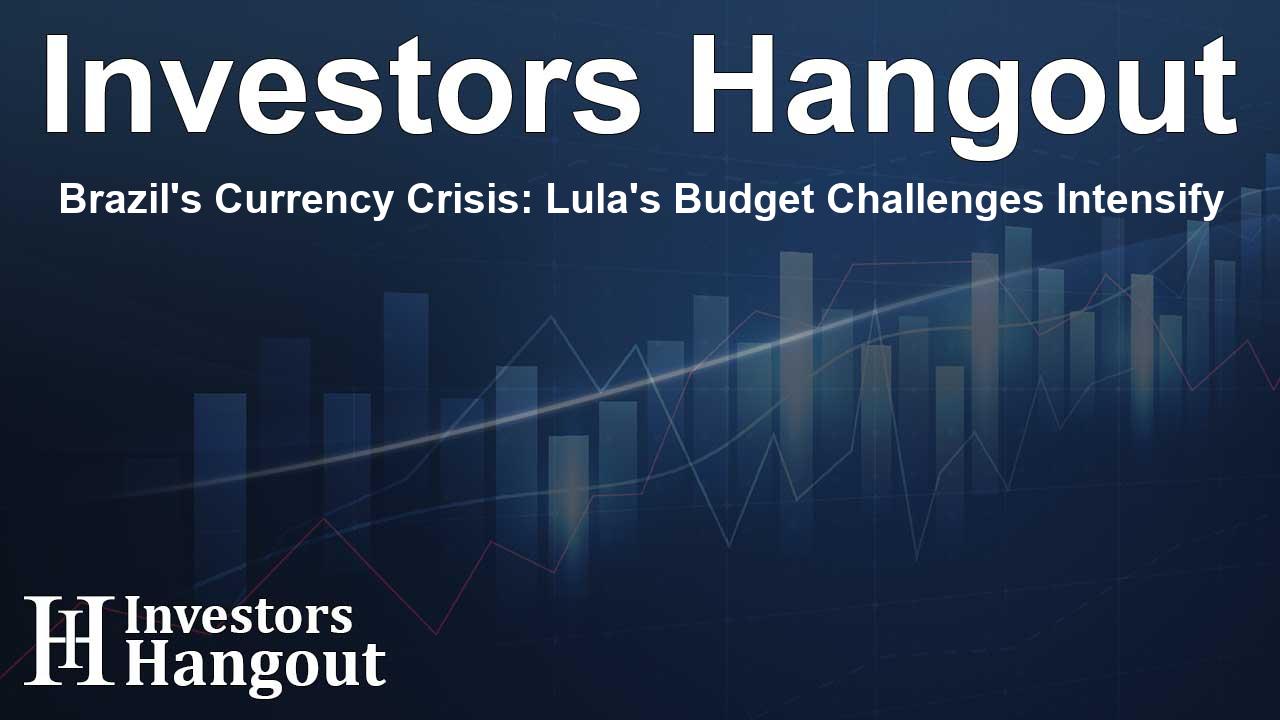Brazil's Currency Crisis: Lula's Budget Challenges Intensify

Brazil's Currency Faces Unprecedented Decline
The Brazilian currency, known as the real, is experiencing significant downward pressure as uncertainty regarding President Luiz Inácio Lula da Silva's economic strategies grows. Over the last several days, the real has been one of the poorest performing currencies globally, highlighting concerns among investors.
Recent Performance of the Real
In the past week, the real has suffered a steep decline of over 3% against the US dollar. Quite notably, this fall brings its total depreciation against the dollar to over 21% over the last year, raising alarm bells for both domestic and international investors.
Government's Response to Currency Challenges
On a recent Wednesday, Brazil’s Finance Minister, Fernando Haddad, addressed the media, suggesting that the currency might be potential target for a “speculative attack.” Reports indicate that these comments further exacerbated the real's decline, as investors reacted with skepticism regarding Brazil's financial stability.
Budget Initiatives Under Scrutiny
At the heart of the issue is Lula da Silva’s plan to reduce the country’s budget deficit. Recently, a set of austerity measures, aimed at cutting 70 billion reais—approximately $11.3 billion—from the federal budget, has gained preliminary approval from Brazil's lower legislative house. However, the efficacy and support of such measures remain in question.
Investor Sentiment and Political Support
The initial proposals presented during the summer met criticism, not only from the financial markets but also within Lula da Silva’s political faction. The lack of backing from peers within his leftist party indicates potential political discord that could hinder effective implementation of the budgetary corrections necessary for stabilizing the economy.
Public Perception of Lula's Administration
According to a recent survey by Pew Research, only 48% of the Brazilian population holds a favorable view of President Lula, suggesting a division in public sentiment regarding his leadership and governance. With this kind of approval rating, it's understandable that investors might feel nervous about the potential for effective policy changes.
Impact on Brazilian Equities and Investors
The repercussions of these economic challenges are evident in the performance of Brazilian stocks. The iShares MSCI Brazil ETF, represented by the ticker EWZ, has recorded a staggering 6% drop in share value on Wednesday alone. Over the course of 2024, this benchmark has faced an overall depreciation exceeding 34%.
Conclusion
The ongoing struggles of the Brazilian real reflect broader economic uncertainties that stem from President Lula da Silva's ambitious budgetary plans. As investors closely monitor developments and the administration attempts to navigate through this fiscal crisis, the coming months will be crucial in determining the trajectory of Brazil's economy.
Frequently Asked Questions
What is the current performance of the Brazilian real?
The Brazilian real has plummeted over 3% against the US dollar in the past week, marking a decline of more than 21% over the past year.
Who is responsible for Brazil's recent budget proposal?
Finance Minister Fernando Haddad introduced the recent budgetary measures as part of President Lula da Silva’s plan to address the country's deficit.
How has the public reacted to President Lula's administration?
Currently, only 48% of Brazilians view Lula favorably, indicating a mixed public perception towards his policies and leadership.
What has been the impact on Brazilian equities?
Brazilian equities, particularly the iShares MSCI Brazil ETF (EWZ), have suffered a significant drop, trading down over 34% in 2024.
Are there concerns about speculative attacks on the real?
Yes, Finance Minister Haddad has suggested that the Brazilian real could be subjected to speculative attacks, contributing to its current volatility.
About Investors Hangout
Investors Hangout is a leading online stock forum for financial discussion and learning, offering a wide range of free tools and resources. It draws in traders of all levels, who exchange market knowledge, investigate trading tactics, and keep an eye on industry developments in real time. Featuring financial articles, stock message boards, quotes, charts, company profiles, and live news updates. Through cooperative learning and a wealth of informational resources, it helps users from novices creating their first portfolios to experts honing their techniques. Join Investors Hangout today: https://investorshangout.com/
Disclaimer: The content of this article is solely for general informational purposes only; it does not represent legal, financial, or investment advice. Investors Hangout does not offer financial advice; the author is not a licensed financial advisor. Consult a qualified advisor before making any financial or investment decisions based on this article. The author's interpretation of publicly available data shapes the opinions presented here; as a result, they should not be taken as advice to purchase, sell, or hold any securities mentioned or any other investments. The author does not guarantee the accuracy, completeness, or timeliness of any material, providing it "as is." Information and market conditions may change; past performance is not indicative of future outcomes. If any of the material offered here is inaccurate, please contact us for corrections.